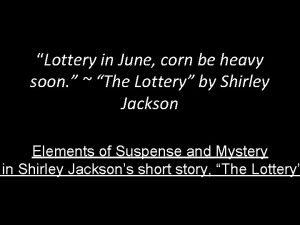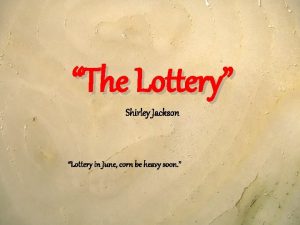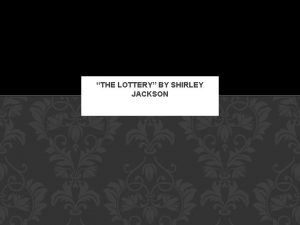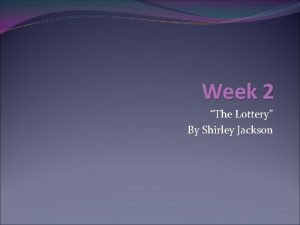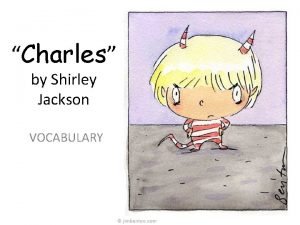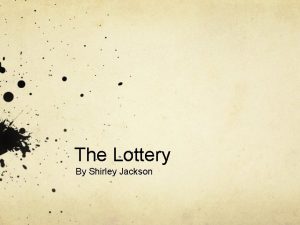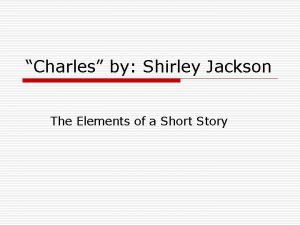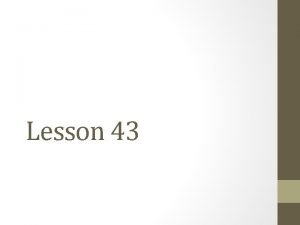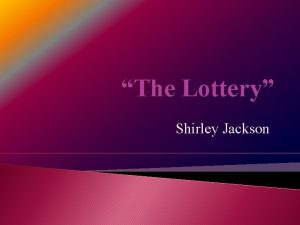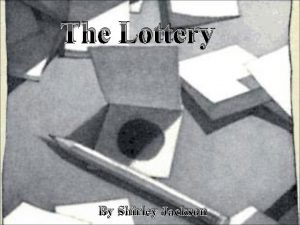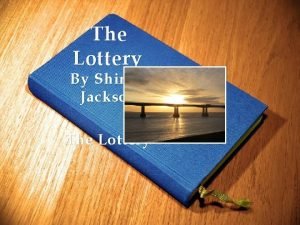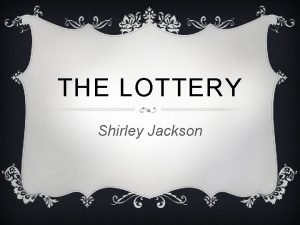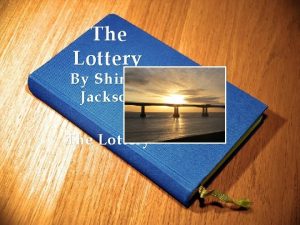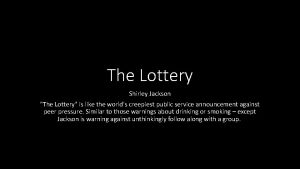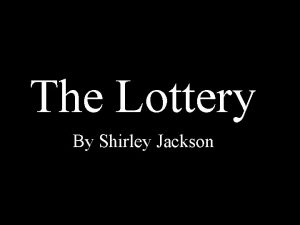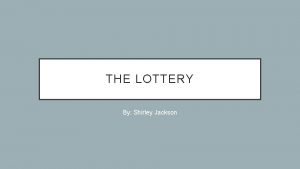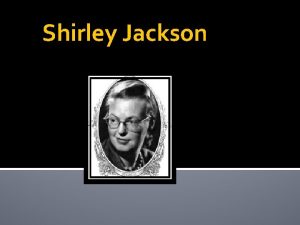The Lottery Shirley Jackson Lottery in June corn










- Slides: 10

“The Lottery” Shirley Jackson “Lottery in June, corn be heavy soon. ”

You Have All Been Entered to Take Part in a Lottery !!! • Pick a white piece of paper out of the box. • Keep the paper folded. • Once everyone has chosen a piece of paper, open the folded paper. • If you have a black dot on your piece of paper – YOU WON !

ANALYSIS QUESTIONS 1. In the third paragraph, what suggests that the lottery is a serious event? 2. What are the rules concerning people who cannot attend the lottery? 3. How are women treated in this town ? 4. What signs are there of the people’s nervousness during the drawing? 5. What arguments for keeping the lottery are presented by Old Man Warner? 1. 6. How does the winner react when he wins the first round of the lottery? How does his wife react? 7. What phrases show the winner’s wife’s extreme emotions felt when winning the lottery? What effort does she make to control these emotions?

Uh…Okay • A woman was murdered (stoned to death) in front of her neighbors, friends and family. • All because she “won” the lottery. • “Lottery in June, corn be heavy soon. ”

Ancient Ritual Sacrifice • In ancient Athens, Greece, Athenians believed that human sacrifice promised fertile crops. • Each year in ancient Athens, during the annual festival called Thargelia, citizens would stone to death a man and a woman selected for this purpose. • Death is thought to bring prosperity to the community. • By transferring one's sins to persons or animals and then sacrificing them, people believed that their sins would be eliminated, a process that has been termed the "scapegoat".

Ritual Without Meaning • Because there has "always been a lottery“, the villagers feel compelled to continue this horrifying tradition. • They focus, however, on its gruesome rather than its symbolic nature, nature for they "still remembered to use stones" even after they have "forgotten the ritual and lost the original black box“. • The story may be saying that humanity's inclination toward violence overshadows society's need for civilized traditions.

Tradition vs. Change The theme of tradition versus change is present in this short story. A) What are some examples of traditions that have changed in today`s society? B) Where in the story do we see the struggle or tension of how tradition is changing?

Irony & Foreshadowing • Draw a vertical line down the middle of a sheet of paper, making two columns. The left column will contain examples of irony, and the right column will contain examples of foreshadowing. • Work in pairs, to identify examples of irony and foreshadowing throughout the story.

SYMBOLS: What do each of these items and names symbolize? Symbols • • • The black box The color black The stones The black dot The Village Square Symbolic Names • • Mr. Summers Mr. Graves Mrs. Delacroix Mr. Warner

• The black box (coffin) • The color black (death, evil) • The stones (sticks and stones may break my bones …well they did. ) • The black dot (sign of evil, stigma, tainted) • The Village Square (congregation, sense of community) • Mr. Summers (setting) • Mr. Graves (grave- serious, cemetery, death) • Mrs. Delacroix (of the cross – Christian theme) • Mr. Warner (he warns people)
 Lottery in june corn be heavy soon
Lottery in june corn be heavy soon Lottery in june corn be heavy soon
Lottery in june corn be heavy soon Symbols in the lottery
Symbols in the lottery Allusions of the lottery
Allusions of the lottery The lottery shirley jackson questions
The lottery shirley jackson questions Literary elements of the lottery
Literary elements of the lottery Michael jackson vocabulary
Michael jackson vocabulary The lottery by shirley jackson discussion questions
The lottery by shirley jackson discussion questions Charles shirley jackson characters
Charles shirley jackson characters Whats the theme of the lottery by shirley jackson
Whats the theme of the lottery by shirley jackson Irony in the lottery
Irony in the lottery
